Welcome the Fall Crop of Gastronomy Students, #3
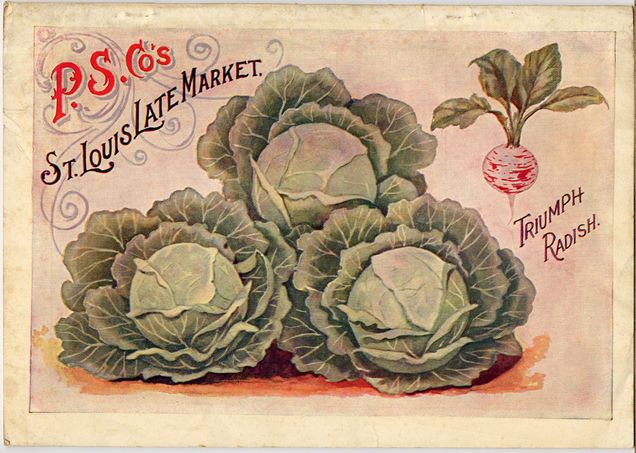
We continue our introductions to student who will be joining the Gastronomy Program this fall with these three bios.
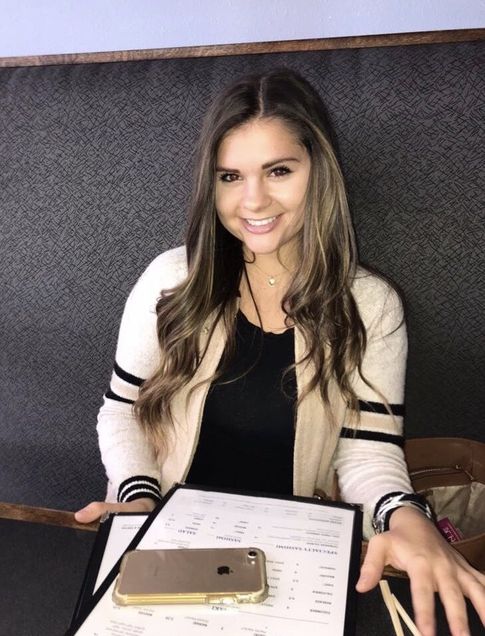 Victoria Collins grew up moving around the globe (Missouri, Maine, Florida, Indiana, Iowa, South Carolina, Dominica, and Spain). Throughout her travels, she developed a deep passion for food, culture, and history. After graduating from Drake University in 2016 with a degree in Education, she began Law School. Her life took a turn once she realized how unfulfilling the legal field was to her soul. Victoria decided to follow her appetite for food and culture; and enroll in Boston University’s Gastronomy program. Victoria’s interests include cooking, traveling, venturing to new restaurants, the farm to table concept, and hobby farming. She plans to become a professor of Gastronomy or another food related subject in the future; in hopes of connecting her education background with Gastronomy.
Victoria Collins grew up moving around the globe (Missouri, Maine, Florida, Indiana, Iowa, South Carolina, Dominica, and Spain). Throughout her travels, she developed a deep passion for food, culture, and history. After graduating from Drake University in 2016 with a degree in Education, she began Law School. Her life took a turn once she realized how unfulfilling the legal field was to her soul. Victoria decided to follow her appetite for food and culture; and enroll in Boston University’s Gastronomy program. Victoria’s interests include cooking, traveling, venturing to new restaurants, the farm to table concept, and hobby farming. She plans to become a professor of Gastronomy or another food related subject in the future; in hopes of connecting her education background with Gastronomy.
Jay DiBiasio has lived in every corner of the country and spent his adult life unsuccessfully trying to root down in any one of them other than Massachusetts, where he was primarily raised. After having spent over a decade as a professional musician and following whichever way the wind took him, he finally accepted after returning like a boomerang, that here is home.
In addition to being a musician, Jay has most recently worked for several years as a sales rep for a local brewery and distributor where he discovered that though he enjoyed a good bottle of suds as much as the next beer guy or gal, what he really was most interested in was talking to his colleagues about food and cooking. That passion grew like a slow flame overtaking most of his free thoughts.
When he and his wife started a family a few years ago, feeding their kids healthy, fres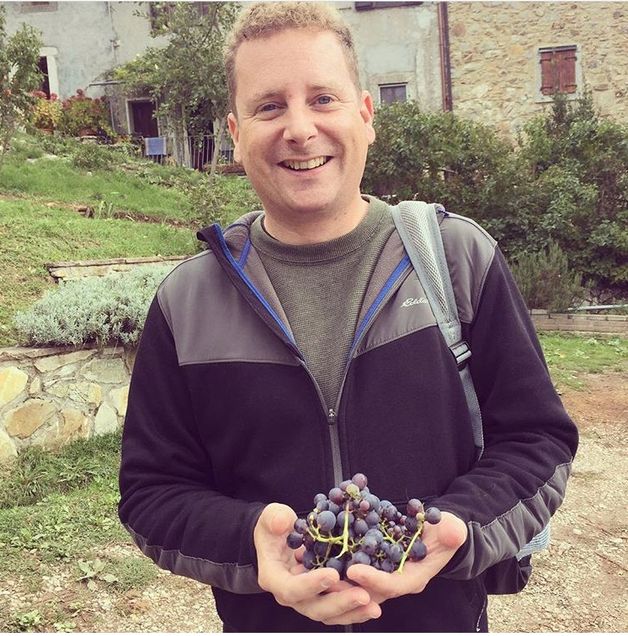 h, and local food became of great importance. They enjoyed making their own baby food to the point where Jay left his tenure as a rep to start a homemade baby food business together with his wife. In planning and writing a business plan, they learned a great many things and ultimately decided it was not the right time and a different direction was needed. Somewhat lost and doing some soul searching, Jay stumbled upon the Gastronomy program right here in his backyard. Feeling like he has found his calling, Jay comes into the program with a renewed excitement to learn, meet new people, get back to work.
h, and local food became of great importance. They enjoyed making their own baby food to the point where Jay left his tenure as a rep to start a homemade baby food business together with his wife. In planning and writing a business plan, they learned a great many things and ultimately decided it was not the right time and a different direction was needed. Somewhat lost and doing some soul searching, Jay stumbled upon the Gastronomy program right here in his backyard. Feeling like he has found his calling, Jay comes into the program with a renewed excitement to learn, meet new people, get back to work.
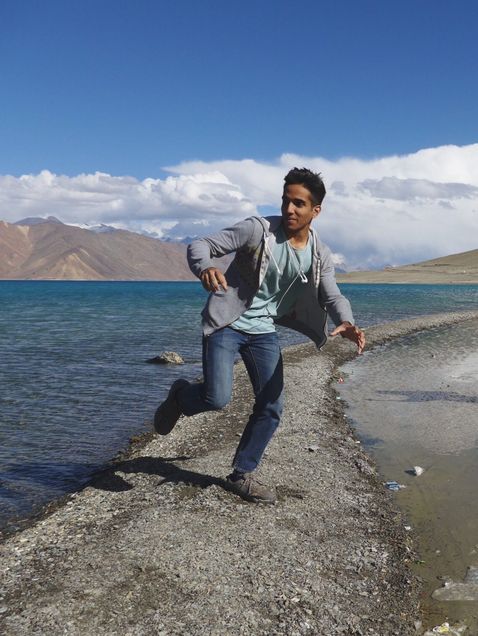 Coming from an internationally exposed, culinarily focused and rather open minded household, food and drink were always subjects Altamash Gaziyani was allowed to have an opinion on. It was always a topic that he could immerse himself into fully, whether he was idly bantering over Masterchef Australia episodes, or making a case for agricultural rights in papers and as a representative at world conferences. Gastronomy has been his North Star since he was eleven and his mother—a trained chef and food photographer—first handed him the recipe for a shepherd’s pie, and he knew it was the only subject he would want to pay his bills with.
Coming from an internationally exposed, culinarily focused and rather open minded household, food and drink were always subjects Altamash Gaziyani was allowed to have an opinion on. It was always a topic that he could immerse himself into fully, whether he was idly bantering over Masterchef Australia episodes, or making a case for agricultural rights in papers and as a representative at world conferences. Gastronomy has been his North Star since he was eleven and his mother—a trained chef and food photographer—first handed him the recipe for a shepherd’s pie, and he knew it was the only subject he would want to pay his bills with.
He immersed himself into cooking, and found himself in the bucolic cradle of the Hudson Valley at the Culinary Institute of America. Here, he used his undergraduate degree in Culinary Science to zoom in on the intricacies of Indian cuisine and methodically answer all his questions about why food behaved the way it did when humans manipulated it. Relocating to Boston, his life took a sharp turn when he realized that professional kitchens weren’t where he was the most personally satisfied with his work, and found himself as a bar-back and eventually an apprentice bartender at The Hawthorne, one of the nation’s preeminent cocktail bars. Bartending fit him like a velvet glove; Altamash remains captivated by how he to gets to harvest the bartending community in Boston to learn about and invest in the confluence of creativity and hospitality that he’s so passionate about. He found that his mind could still sharpen as the first ticket of the night came through, just as it did in a kitchen, and he could still transcribe flavors at the edge of his consciousness into a glass…he just got the chance to do it on display now, and be both creative and kind to his guests and coworkers.
And yet, the questions never ceased. In shifting his pantry from a walk-in to a back bar with wells and top shelves, he found that every bottle told an anthropological story, and every liquor-sodden story was deeply grounded in history and politics, community and commensality, family and emotion. As someone entrusted to pouring and mixing these ‘ingredients’ together to pull the most profuse flavor out of them and also convey their emotional resonance, Altamash is determined to make the most out of BU’s resources by learning as much as he can about bartending and liquor through a gastronomic lens.
Course Spotlight: Food Policy Courses in the Gastronomy Program
Dr. Ellen Messer teaches Food Policy classes in the Gastronomy Program and has prepared this overview of her classes.
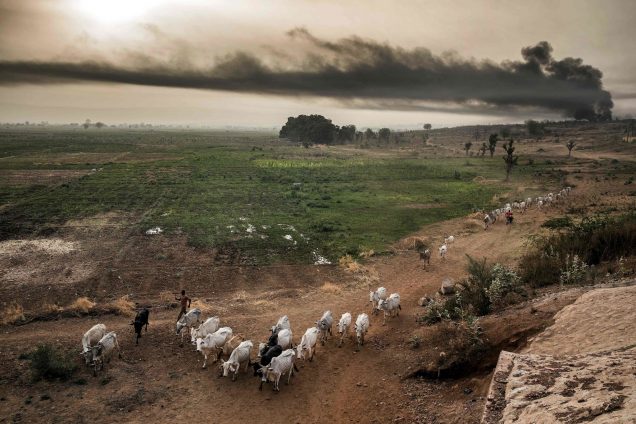
NYT front page headline news asserts “Climate Change Threatens the World Food Supply, UN Warns” by Christopher Flavell, 8 Aug19). But how do agricultural and nutritional policies contribute to causation and potential mitigation? Can better understandings of national food systems and policies, and cultural dietary constructions influence outcomes?
BU Gastronomy’s policy track, as part of the BU MLA in Gastronomy, crafts answers to these questions. Two courses— “World Food Systems and Policy” (MET ML 720, offered in fall term) and “US Food Systems and Cultural Politics” (MET ML 721, offered in spring term) are specifically dedicated to clarifying international and US policy issues. A third, “Local to Global Food Values: Policy, Practice, and Performance” (MET ML 719, to be offered on-line in spring or summer term), addresses environmental, economic, cultural, and nutritional dimensions that influence producer, consumer, marketing, and regulator behaviors. Each combines a range of multi-disciplinary theoretical, advocacy, and practical readings, along with well-structured discussion exercises and written assignments that prepare participants for roles in food businesses, government agencies, and non-profit organizations, including research and activist policy think tanks.
Enrollment in MET ML 720 and MET ML 721 is open to Gastronomy and other graduate students, and to advanced undergrads with the permission of the instructor.
MET ML 720, World Food Systems and Policy, with Dr. Ellen Messer, will meet in the Fall 2019 Semester on Tuesday evenings from 6:00 to 8:45 PM beginning on September 3. You can register here.
MET ML 721, US Food Systems and Cultural Politics, will meet on Tuesday evening in the Spring 2020 semester.
Welcome the Fall 2019 Crop of Gastronomy Students, #2
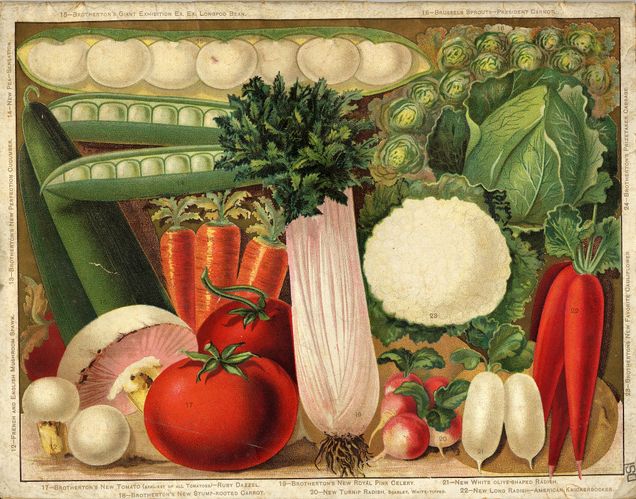
We continue our introductions to student who will be joining the Gastronomy Program this fall with these four bios.
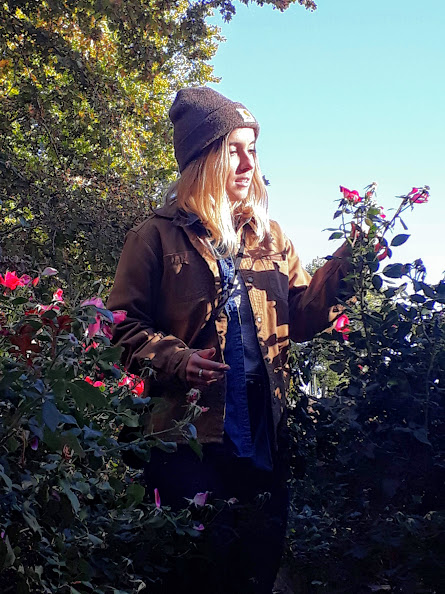 Danielle Jacques spent her childhood jumping on hay bales at her grandparents’ dairy farm in Maine. Too busy dunking homemade cookies in fresh milk, she never realized the hardships of small-scale farming and was shocked when the farm suddenly closed. During her first year at Smith College, she studied the economics of agriculture, trade, development, and poverty in the food system, which put her small family farm into a global, political context. She spent the rest of her college career studying the impact of global trade and agricultural policies on food producers. Her research brought her to sugar plantations in the Dominican Republic and to Havana, Cuba, where she studied the impact of US trade restrictions on Cuban farmers.
Danielle Jacques spent her childhood jumping on hay bales at her grandparents’ dairy farm in Maine. Too busy dunking homemade cookies in fresh milk, she never realized the hardships of small-scale farming and was shocked when the farm suddenly closed. During her first year at Smith College, she studied the economics of agriculture, trade, development, and poverty in the food system, which put her small family farm into a global, political context. She spent the rest of her college career studying the impact of global trade and agricultural policies on food producers. Her research brought her to sugar plantations in the Dominican Republic and to Havana, Cuba, where she studied the impact of US trade restrictions on Cuban farmers.
After graduating, Danielle spent a year in Maine before hopping across the pond to teach English in Spain. While living in Madrid, she started a blog to write about her experiences tasting, making, and sharing food. Her posts ranged from the role of Communism in establishing a unified Bulgarian national cuisine to the significance of representation and cultural integration of the doner kebab. She also blogged for Madrid’s refugee resettlement organization, Madrid For Refugees, covering classes taught through their Chefugee program as well as the Refugee Food Festival.
Coming from Julia Child’s alma mater, Danielle is thrilled to develop a career in the realm of food academia at the graduate program Julia founded. Most days, you can find her behind the cheese counter at Formaggio Kitchen, talking at length about the incredible cheeses from small dairies not unlike her family’s. In her free time she enjoys reading about food, writing about food, and making food for loved ones.
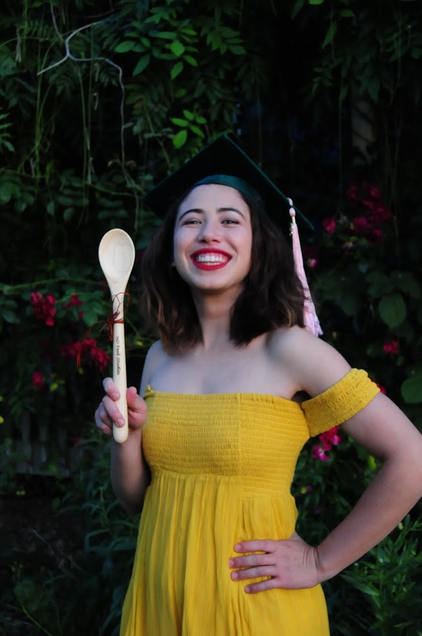 From humble beginnings, Elizabeth Weiler holds roots in fast-food saturated Van Nuys, California, where words like ‘organic’ and ‘local’ are only thrown around to poke fun at ‘hippie vegans’. For the past few years, Elizabeth has made her home in the Pacific Northwest where the sentiment towards food is dramatically opposite and both food transparency and sustainability are at the forefront of consumer values. Studying food studies at the University of Oregon opened Elizabeth’s eyes to the breadth of impact that food industries have and the challenges they are facing today. Taking on employment at various restaurants, an organic produce company, a food bank garden, and a French-American bakery has given Elizabeth much insight into the ever-changing role of food in society. It has also given her an immense drive to be a part of shaping a sustainable future for these vital food systems. In order to take on this venture, she must be able to gain a more in-depth knowledge on the foodways that shape the world. Elizabeth is thrilled to quench her thirst for knowledge at Boston University’s master’s program.
From humble beginnings, Elizabeth Weiler holds roots in fast-food saturated Van Nuys, California, where words like ‘organic’ and ‘local’ are only thrown around to poke fun at ‘hippie vegans’. For the past few years, Elizabeth has made her home in the Pacific Northwest where the sentiment towards food is dramatically opposite and both food transparency and sustainability are at the forefront of consumer values. Studying food studies at the University of Oregon opened Elizabeth’s eyes to the breadth of impact that food industries have and the challenges they are facing today. Taking on employment at various restaurants, an organic produce company, a food bank garden, and a French-American bakery has given Elizabeth much insight into the ever-changing role of food in society. It has also given her an immense drive to be a part of shaping a sustainable future for these vital food systems. In order to take on this venture, she must be able to gain a more in-depth knowledge on the foodways that shape the world. Elizabeth is thrilled to quench her thirst for knowledge at Boston University’s master’s program.
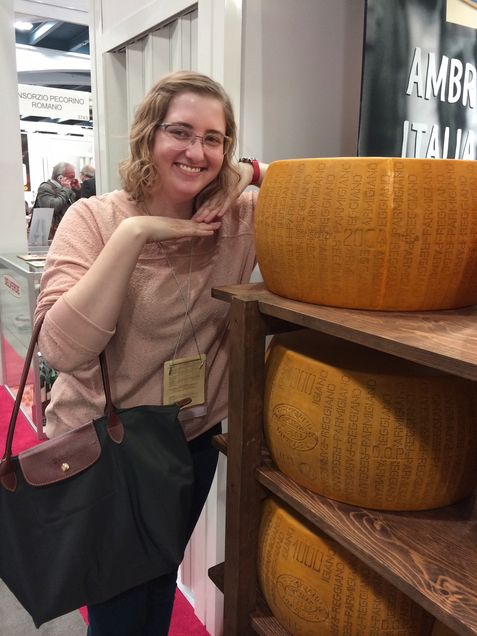 Kate Watson recently moved to Boston with her husband and son after a lifetime in the San Francisco Bay Area. Growing up in a food-obsessed family, she received an early education in the importance of shared meals, wine, and the value of "harvesting" your own Thanksgiving turkey.
Kate Watson recently moved to Boston with her husband and son after a lifetime in the San Francisco Bay Area. Growing up in a food-obsessed family, she received an early education in the importance of shared meals, wine, and the value of "harvesting" your own Thanksgiving turkey.
After initially pursuing Psychology, Kate made her way to the food industry, where she has worked for the past decade. Kate’s time in the ingredient sourcing world opened her eyes to the complexity of agricultural supply chains, while her work on Clif Bar & Company’s Community team with organic agriculture and food-centered nonprofits inspired her to dig deeper into the world of food. After a health-related diet shift, Kate also became interested in the relationship between food and belonging. She is extremely excited to explore Gastronomy with others who share her passion for learning.
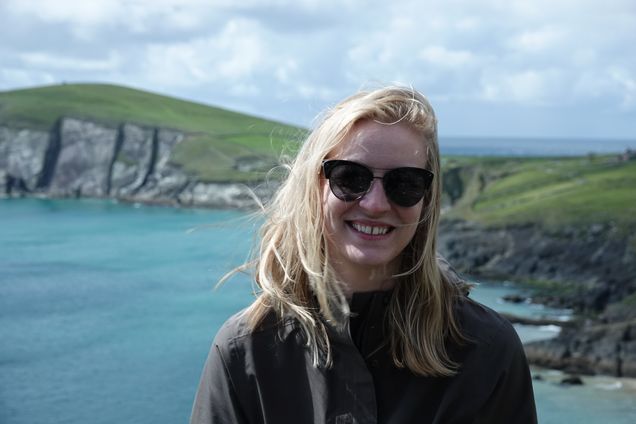 Elle Wignall was born and raised in Iowa, where salads don't have to include greens, chili is best enjoyed with a side of cinnamon roll, and ranch reigns supreme. Elle joins the Gastronomy program with a deep appreciation of the regional cuisine she was raised on and a hunger to explore cultures and relationships through the lens of food. Like many in the food industry, Elle has been heavily influenced by the cooking of her grandmothers. Elle received an English degree with a nonfiction writing focus from the University of Iowa and currently works in the financial industry as a technical writer. She moonlights as an essayist and baker-- usually of sourdough bread and pies.
Elle Wignall was born and raised in Iowa, where salads don't have to include greens, chili is best enjoyed with a side of cinnamon roll, and ranch reigns supreme. Elle joins the Gastronomy program with a deep appreciation of the regional cuisine she was raised on and a hunger to explore cultures and relationships through the lens of food. Like many in the food industry, Elle has been heavily influenced by the cooking of her grandmothers. Elle received an English degree with a nonfiction writing focus from the University of Iowa and currently works in the financial industry as a technical writer. She moonlights as an essayist and baker-- usually of sourdough bread and pies.
Welcome the Fall 2019 Crop of Gastronomy Students
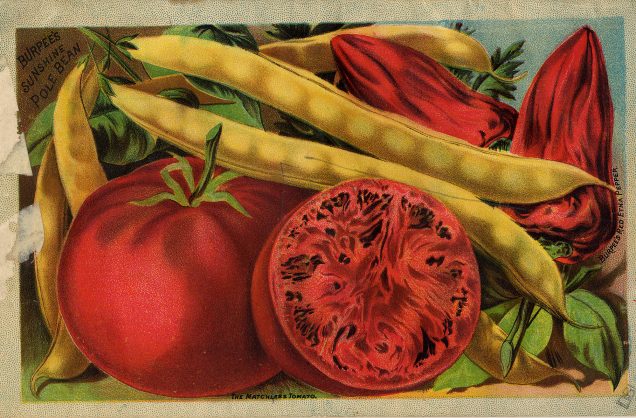
We hope you will enjoy getting to know some of the new students who will be joining the Gastronomy Program in September.
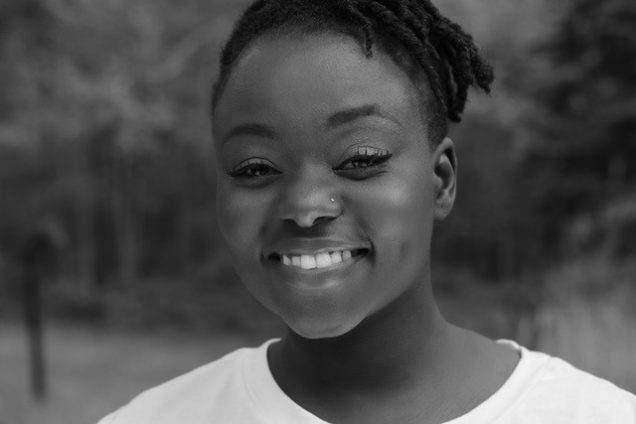 Neema Syovata feels fortunate to have been born in Nairobi, Kenya – where she had many beautiful and varied culinary experiences fostered by grandparents who were culinary geniuses! She received her undergraduate degree in International Business, Entrepreneurship and Spanish from Northeastern University, before moving to NYC. There, she joined the PR department of Food & Wine magazine, where she got the opportunity to participate in culinary events such as the Food &Wine Classic in Aspen, and Best New Chefs. Spending time in the world of culinary publishing/events piqued her interest further on the subject of food. She noticed that African cuisine is seldom represented on the culinary landscape and this in turn led her to ponder the future of Modern African Cuisine, which is something she would like to dedicate her purpose to.
Neema Syovata feels fortunate to have been born in Nairobi, Kenya – where she had many beautiful and varied culinary experiences fostered by grandparents who were culinary geniuses! She received her undergraduate degree in International Business, Entrepreneurship and Spanish from Northeastern University, before moving to NYC. There, she joined the PR department of Food & Wine magazine, where she got the opportunity to participate in culinary events such as the Food &Wine Classic in Aspen, and Best New Chefs. Spending time in the world of culinary publishing/events piqued her interest further on the subject of food. She noticed that African cuisine is seldom represented on the culinary landscape and this in turn led her to ponder the future of Modern African Cuisine, which is something she would like to dedicate her purpose to.
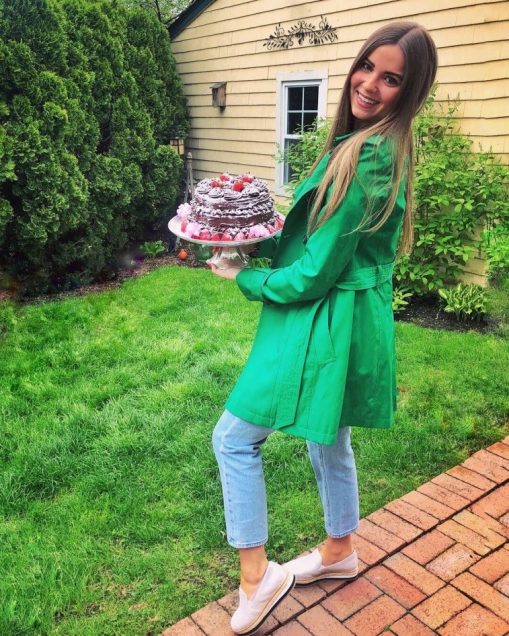
Stella Morfessis is from Long Island, New York. She recently moved to Boston to start a new job as a laboratory technician in the Department of Molecular Genetics at Boston University. In 2018 she received a B.S. in Biology from Marist College but has always been interested in actively being a part of the culinary world. Her culinary journey started when she was a child, watching her mother and grandmother cook traditional Greek dishes together at home.
Stella always found food intriguing, however she never thought about it scientifically until she studied microbiology and biochemistry in college. Taking those courses led her to ponder the makeup of food and also how it affects the human body. In microbiology, she learned about fermentation which peaked her interest in the science of wine making. She also learned about the role of fungus in the production of one of her favorite food groups, cheese. Stella’s ideal job would allow her to blend her interests of science and the culinary arts, working in recipe development. Stella is excited to fully embrace the culinary world by learning more about the culture and roots of different cuisines as well as how her background in the sciences can be incorporated into her cooking.
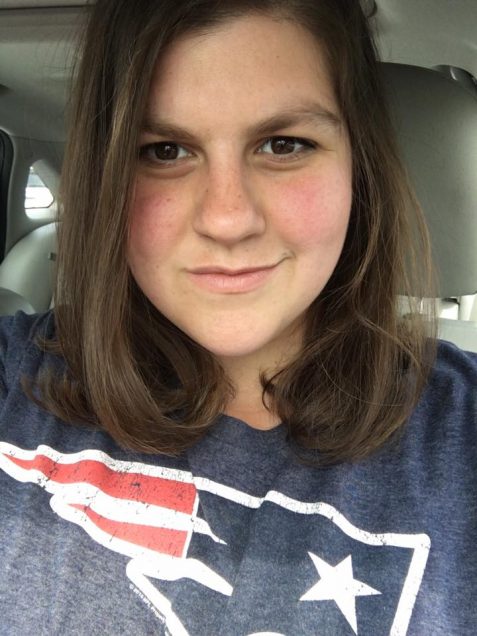
Catie Duckworth was raised in Western Pennsylvania in an Italian American family where they often celebrated the food of their heritage. She learned to cook many Italian recipes that were passed down through the family, kick starting her love of food and cooking at a young age. After graduating college, Catie moved to Washington, D.C. to pursue a career in the legal field. She worked at a Veterans law firm for over four years before making the decision to change course in her career.
Catie has put her passion for food into her food blog, Catie Cooks, where she writes about everything food-related. She loves spending time developing new recipes for her blog. Through the gastronomy program, Catie hopes to gain more technical culinary skills to apply to her recipe development. She is very excited to begin her new life in Boston, especially to explore all the Italian food in the North End.
Announcing the Fall 2019 Pépin Lecture Series in Food Studies & Gastronomy
Programs in the Pépin Lecture Series in Food Studies & Gastronomy are free and open to the public, but registration is requested.
We Will Feast: Rethinking Dinner, Worship, and the Community of God
With author Kendall Vanderslice
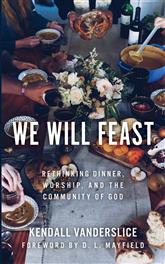
The gospel story is filled with meals. It opens in a garden and ends in a feast. Records of the early church suggest that believers met for worship primarily through eating meals. Over time, though, churches have lost focus on the centrality of food-- and with it a powerful tool for unifying Christ's diverse body.
But today a new movement is under way, bringing Christians of every denomination, age, race, and sexual orientation together around dinner tables. Men and women nervous about stepping through church doors are finding God in new ways as they eat together. Kendall Vanderslice shares stories of churches worshiping around the table, introducing readers to the rising contemporary dinner-church movement. We Will Feast provides vision and inspiration to readers longing to experience community in a real, physical way.
Kendall Vanderslice is a graduate of the BU Gastronomy Program and has recently received her MA in Theological Studies from Duke University.
Friday, September 20 at 6 PM
College of General Studies, 871 Commonwealth Avenue, Boston MA, room 505
Meat Planet: Artificial Flesh and the Future of Food
With author Benjamin Aldes Wurgaft
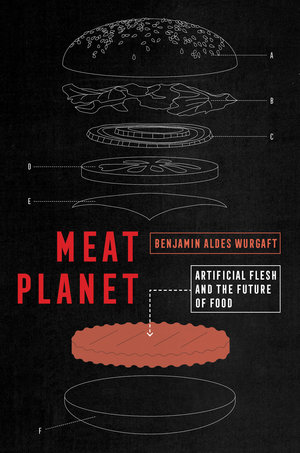
In 2013 a Dutch scientist unveiled the world’s first laboratory-created hamburger, and since then the idea of producing meat, not from live animals but from carefully cultured tissues, has spread like wildfire through the media. Meanwhile, cultured meat researchers race against population growth and climate change in an effort to make sustainable protein. Meat Planet explores the quest to generate meat in the lab—a substance sometimes called “cultured meat”—and asks what it means to imagine that this is the future of food.
Benjamin Aldes Wurgaft is a writer and historian, and currently a Visiting Scholar in Anthropology at MIT. He was a National Science Foundation Postdoctoral Fellow at MIT and a Mellon Postdoctoral Fellow at the New School for Social Research. His essays on food and other topics appear regularly in publications from Gastronomica to the Los Angeles Review of Books to the Hedgehog Review
Thursday, October 10, 2019 at 6 PM
College of General Studies, 871 Commonwealth Avenue, Boston MA, room 505
Vanishing Bees: Science, Politics, and Honeybee Health
With author Daniel Kleinman
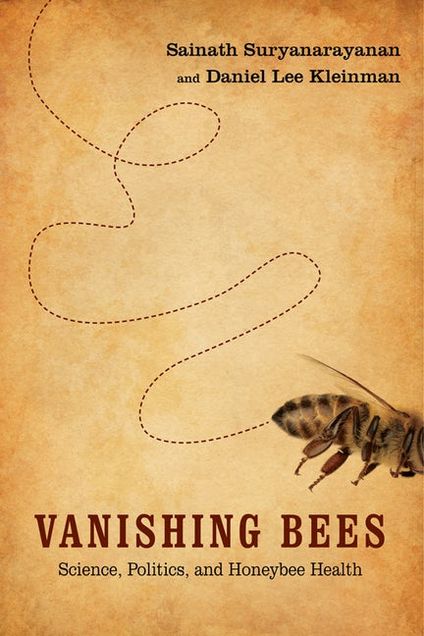
Vanishing Bees takes us inside the debates over widespread honeybee deaths, introducing the various groups with a stake in solving the mystery of Colony Collapse Disorder, including beekeepers, entomologists, growers, agrichemical companies, and government regulators. Drawing from extensive interviews and first-hand observations, Sainath Suryanarayanan and Daniel Lee Kleinman examine how members of each group have acquired, disseminated, and evaluated knowledge about CCD. In addition, they explore the often-contentious interactions among different groups, detailing how they assert authority, gain trust, and build alliances.
Daniel Kleinman is the Associate Provost for Graduate Affairs in the Office of the Provost and Professor of Sociology in the College of Arts & Sciences.
This program will be complemented by a honey-based tasting prepared by Chef Janine Sciarappa.
Thursday, October 24 at 6 PM
Fuller Building, 808 Commonwealth Avenue, Boston MA, room 117
Food Routes: Growing Bananas in Iceland and Other Tales from the Logistics of Eating
With author Dr. Robyn Metcalfe
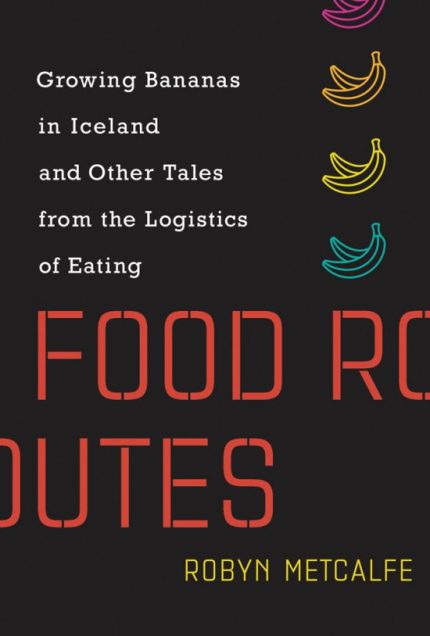
Even if we think we know a lot about good and healthy food—even if we buy organic, believe in slow food, and read Eater—we probably don't know much about how food gets to the table. What happens between the farm and the kitchen? Why are all avocados from Mexico? Why does a restaurant in Maine order lamb from New Zealand? In Food Routes, Robyn Metcalfe explores an often-overlooked aspect of the global food system: how food moves from producer to consumer. She finds that the food supply chain is adapting to our increasingly complex demands for both personalization and convenience—but, she says, it won't be an easy ride.
Robyn Metcalfe, a food historian and food futurist, is a Lecturer and Research Scholar at the University of Texas at Austin and Director of Food+City. She holds a PhD in history from Boston University.
Tuesday, November 5 at 6 PM
College of General Studies, 871 Commonwealth Avenue, Boston MA, room 505
Observing Nostalgia
This post from Gastronomy Student Caitlin Bueno continues our series from students in Anthropology of Food.
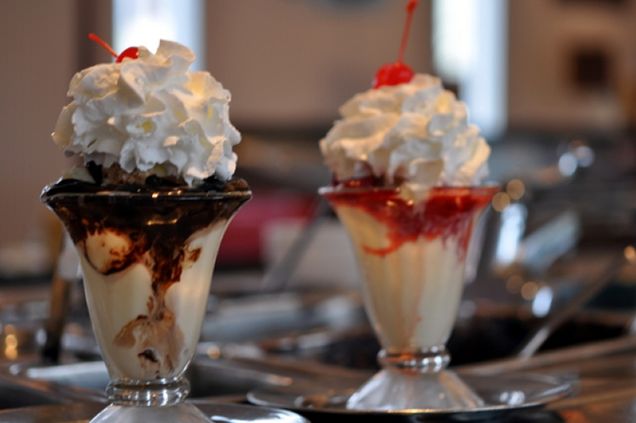
Cabot’s Ice Cream & Restaurant is “a family owned and operated old-fashioned ice cream parlor and restaurant” in Newton, MA. The restaurant, known for its ice cream sundaes, also has a full menu serving breakfast all-day, and diner fare such as burgers, soup du jour and daily specials. Cabot’s, opened since 1969, emphasizes its mission to “provide quality, value, service and consistency to all…customers” in several locations on its website. At Cabot’s, nostalgia is served on a silver platter, a treat for all five senses.
Sitting at the restaurant counter, my eyes are immediately drawn to the oversized, colorful and enticing sundaes that are moving quickly out of the central ice cream workstation. The restaurant smells very sweet, understandable with the volumes of ice cream and toppings present, but also has the faint smell of fried foods, coming from the kitchen in the back of the restaurant. The dining room is lively and filled with sound. There are many customers laughing, wait staff talking, the soft serve and milkshake machines whirring, dishes placed on the stone counter and into clearing bins, glass clanging against the metal ice cream workstation, and noise coming from the kitchen. The floor and counter are sticky, inevitable from the overfilled, dripping sundaes enjoyed around the restaurant.
Finally, the taste of nostalgia – mint chocolate chip ice cream with hot fudge and fresh whipped cream. The experience at Cabot’s communicates nostalgia, though the food, atmosphere and décor. Handmade, cold, sweet, creamy and rich, a sundae that is hard to find in our modern fast-food nation.
Recognition
This post from Gastronomy Student Altamash Gaziyani continues our series from students in Anthropology of Food.
4th March, 2017
As a food runner during a backed-up lunch service on the first Saturday of a new block, there’s not much I can do to help other than scrabble around, plucking tickets off the floor as they whizz out the machine unrelentingly, and scuffle against the wall, waiting for the floundering students to start putting plates up: the chef can though. Dwayne Lipuma famously shows no mercy when a single cog slides out of place from the ever-ticking, jewelled kitchen that is American Bounty; his prodigious skill and all round bad-assery in the kitchen are probably direct results of his years spent toiling in the industry and the disturbingly acute instincts and skills he’s developed over time. Today, it was overcooked beef that caught his eye. The hefty glaze of sauce wasn’t enough to hide the fact that the tenderloin was no longer blushing and rosy behind its veil; sauce was spattered across the plate like something from a street fair and the miserable brown-grey hunks of meat huddled in the center, the plate angled ‘cleverly’ in a desperate attempt to pass off the dud order.
He kicked into high gear immediately: with a single bellow, the students were cowering against their stations as he stormed down the line, all eyes trained on him. His hands were a busy, coordinated blur; his movements were perfectly coordinated; his eyes whizzed in their sockets as he barked orders and barked some more until they were carried out to his standards. He was absolutely savage, refusing to mince words or take the time to explain his actions—he knew just how long to baste the meat and flash the potatoes, just how much salt to flick into the wilted greens, exactly what order the components went on the plate. In the blink of an eye, we had nine plates of beef up and he continued toiling and raging away as the runners scurried to get the plates out. As I dashed out, I couldn’t help but shoot one last glance behind my back, watching him plate and cook simultaneously, and think that that was a man that knew exactly what impression he was making, and also how thoroughly he’d earned it.
17th August, 2016
I can’t stand it anymore. That pool house is tiny and quite unclean (which is a nicer way of saying its corners are grimier than a toad’s backside) and horribly stuffy during the Virginia summer. There’s barely enough room for one person to dash around and fire onion rings, flip burgers and toss salads for the horde of children swarming outside—I found myself stuck with two servers (who had the sense to bring portable fans) and Carlos. Good God, Carlos. He spent the all of prep chatting with the manager and then with a friend, regaling them with lurid stories about the busy services he’s endured in places “much more high quality” than this, leaving me to prep for about 350 people all by myself. He then proceeded to snatch the most difficult, ‘macho’ job—working the flat top and cooking pre-portioned, cookie-cutter patties of beef while trying to chat up Anu and Taylor, lolling by the front until we opened and rolling their eyes over and over in their skulls as he attempted flip after higher flip. When we were finally open, he swaggered up to the front window, bumping the two girls aside and handing plates to customers himself with a trollish grin as I let a continuous, steady stream of muttered swears flow while firing and plating…everything. Everything. I have no idea what he achieved today. All I know is that I hope for goodness sake that his cooking can keep up with his bravado tomorrow; that stuffy little kitchen is all his to work in (and scrub down) after he’s done inflating his ego some more overnight.
19th March, 2016
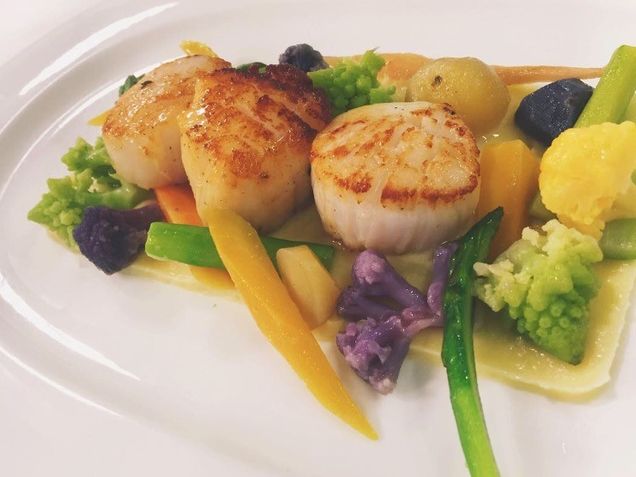 Sean and I have this system down. As an order comes in, he calls out to the other stations to coordinate times as I pour vegetables into different sauté pans over melted butter, ready to fire. When the order’s called, he drops the seafood and I begin picking up the sides, stirring smoked potato puree and basting leeks while he makes sure the scallops are perfectly burnished, the halibut achingly soft. We turn at the same time: I swish the puree across the flat plate, he places the scallops on and I start garnishing with vegetables like clockwork, while he positions the halibut and leeks in another bowl, waiting on me to pour the broth for the second dish. We walk up in perfect time to the pass, a plate in each hand, and set them down for Jasmine and Chef G to garnish, for the kitchen to keep the pace up with, for the customers watching eagerly from the window to admire. I can’t attest for him, but I can feel every single eye on the food as we walk back and see, ever so clearly in my mind’s eye, Chef G’s eyebrows raising unwillingly in surprise and pleasure. God, does recognition feel beautiful.
Sean and I have this system down. As an order comes in, he calls out to the other stations to coordinate times as I pour vegetables into different sauté pans over melted butter, ready to fire. When the order’s called, he drops the seafood and I begin picking up the sides, stirring smoked potato puree and basting leeks while he makes sure the scallops are perfectly burnished, the halibut achingly soft. We turn at the same time: I swish the puree across the flat plate, he places the scallops on and I start garnishing with vegetables like clockwork, while he positions the halibut and leeks in another bowl, waiting on me to pour the broth for the second dish. We walk up in perfect time to the pass, a plate in each hand, and set them down for Jasmine and Chef G to garnish, for the kitchen to keep the pace up with, for the customers watching eagerly from the window to admire. I can’t attest for him, but I can feel every single eye on the food as we walk back and see, ever so clearly in my mind’s eye, Chef G’s eyebrows raising unwillingly in surprise and pleasure. God, does recognition feel beautiful.
28th June, 2015
If I had to describe service tonight, I would call it unnecessary: it was an unnecessary, showy affair that Chef insisted on escalating into a cockfight between all the stations. I was demoted to make cupcake batter for the amenities we give our posh, prima-donna clientele and got to sit this one out, which meant I had a front-row seat to the catastrophe. It started off with a simple jab towards garde manger—the eager externs looking to establish their place in the new exec’s kitchen and earn his respect. “You guys wanna buck up that snail-pace there?”, he drawled, his icy-blue eyes flashing as he shot a roguish wink towards the ‘big guns’ on the hot line. The externs looked like they’d just been tasered, and began floundering in a desolate attempt to quicken service, pushing out niçoises and ceviches (with a certain lack of attention to detail). Chef’s head flicked instantly towards hot apps, as he began taunting the experienced line cooks for “letting the kids thrash” them. I saw several scowls burst across faces and fists clench as they hopped to and began veritably flinging plates at servers while Chef sniggered at the pass.
I saw one extern slip across the floor and smash his forehead against the metal countertop, only to shake off the blinding pain and continue with tears in his eyes. I saw another on the verge of hysterics, bleating incessantly for his partner to buck up as he toiled to keep up with Chef’s demand. I saw one line cook sweating buckets into his sauté pans, his mouth an imperceptible line and a frown scratched across his face, and another pair snapping at each other to keep up with the demand. I saw everybody trying to please the horrible ringleader, dancing along like circus animals to his tune for the fear of feeling his whip, and turned right back around. The cupcake batter deserved more attention than that rigmarole.
1st April, 2010
The clock kept ticking. The risotto was ready, I’d just mounted it with enough butter and pecorino cheese to bring a grown man to his knees—it was good too, if I may say so. I had the prawn skewers all ready to go for people as they walked in; the powerful aromas of honeyed, roasted garlic, and nutty-brow butter that had imbued the shrimp were permeating the house. The pie was ready too: plump and bursting at the seams with lamb and sauce (lamb that cost me a fortune and was probably why I now had no money, but hey, it was worth it). I’d even gotten the cake into the fridge to set; a giant, Oreo-cookie-crusted spectacle, resplendent with fudge crumbs and vanilla ice cream to go with it. As I wiped rivulets of sweat trickling down my forehead, I sat patiently, staring at the door, waited for the twenty-or-so people that had promised to show up for lunch to come. My cat nudged my ankle, her eyes round and anxious, but I gently pushed her aside; these people were bound to show any minute, I thought, and I needed to be ready. I needed to make an impression, because who was I, if I wasn’t the guy that cooked for everybody? The quiet, little boy with the awful fringe that sat in the front row and did everyone’s project assignments? Or the one who got asked to parties out of obligation and watched while everybody danced? No. That wasn’t me. That isn’t me. I can make miracles out of basic ingredients and coax flavours to life. I deserve to be recognized for what it is that I do for these people, for how much I care, even if I have to work harder and wait longer by the door with a plastic smile on my face.
Ten hours later, after I’d poured all my food (minus enough for dinner) into the trash and carried it out myself, weeping senselessly as I stumbled down the stairs and into my pillow at night, the clock kept ticking.
How Madeleines Can Trigger Memory
This post from Gastronomy Student Hannah Spiegelman continues our series from students in Anthropology of Food.
I had never heard of Proust or his madeleine before starting the Gastronomy program at BU, but his famous moment has been talked about or mentioned in almost every class I have taken thus far. In his book, In Search of Lost Time, Proust (1913) takes inspiration from his own life, turning his childhood holiday home in the Loire Valley into the fictional town of Combray, France. The moment that all food studies people, anthropologists, and others have hence talked about occurs when Proust’s narrator (never-named) is offered tea and “petites madeleines.”
Many years had elapsed during which nothing of Combray…had any existence for me, when one day in winter, on my return home, my mother, seeing that I was cold, offered me some tea, a thing I did not ordinarily take…. She sent for one of those squat, plump little cakes called "petites madeleines….” I raised to my lips a spoonful of the tea in which I had soaked a morsel of the cake. No sooner had the warm liquid mixed with the crumbs touched my palate than a shudder ran through me and I stopped, intent upon the extraordinary thing that was happening to me…. I sensed that it was connected with the taste of the tea and the cake, but that it infinitely transcended those savours, could, no, indeed, be of the same nature….Undoubtedly what is thus palpitating in the depths of my being must be the image, the visual memory which, being linked to that taste, is trying to follow it into my conscious mind.
As soon as Proust’s character tastes the madeleine dipped in tea, he experiences an overwhelming feeling of a past time, although he can’t imminently place it. With more tastes, the memory unfolds:
The taste was that of the little piece of madeleine which on Sunday mornings at Combray…when I went to say good morning to her in her bedroom, my aunt Léonie used to give me, dipping it first in her own cup of tea. The sight of the little madeleine had recalled nothing to my mind before I tasted it; perhaps because I had so often seen such things in the meantime, without tasting them…that their image had dissociated itself from those Combray days to take its place among others more recent; perhaps because of those memories, so long abandoned and put out of mind, nothing now survived, everything was scattered; the shapes of things, including that of the little scallop-shell of pastry, so richly sensual under its severe, religious folds…had been so long dormant as to have lost the power of expansion which would have allowed them to resume their place in my consciousness. But when from a long-distant past nothing subsists, after the people are dead, taste and smell alone, more fragile but more enduring…more faithful, remain poised a long time, like souls, remembering, waiting, hoping; and bear unflinchingly, in the tiny and almost impalpable drop of their essence, the vast structure of recollection.
A person’s “senses also interact with memory in the creation of foodways, as Marcel Proust showed by reconstructing and entire social world through the taste and smell of a madeleine” (Tierney and Ohnuki-Tierney 2012, 120). Proust’s character is vividly transported home through his taste experience:
And as soon as I had recognized the taste of the piece of madeleine soaked in her decoction of lime-blossom which my aunt used to give me…immediately the old grey house upon the street, where her room was, rose up like a stage set to attach itself to the little pavilion opening on to the garden which had been built out behind it for my parents….and the whole of Combray and its surroundings, taking shape and solidity, sprang into being, town and gardens alike, from my cup of tea.
Smells and tastes have the power to send people places in their past. Erdinç writes, “The smells and tastes, each time I trace them, in various phases of my own story, like the pebbles in the Hansel and Gretel story, take me home. Putting the pieces together, the picture appears as yet another rendering of the narrative of the self” (Erdinç 2001, 98). Erdinç clarifies that not all taste memories are positive and can equally appear with beloved and hated foods. The point here and that Proust made over 100 years ago is that scents and tastes hold powerful and potent connections to our past, whether that’s a figure from our childhood, a beloved home, a special trip, or an experience of commensality.
I have a culinary concept called A Sweet History in which I make ice cream flavors inspired by historic figures, events, art, etc. The point is to relay history through something accessible like everyone’s (for the most part) favorite frozen food. This long-term project has also helped me delve into stories I wouldn’t have otherwise. While on my quest of teaching others, I learn as well. I often turn my papers and projects into ice cream flavors in order to explore the subject further. Perhaps it has something to do with embodying knowledge. Even though I am not recreating traditional recipes, taking the time to cook my base, bake my mix-ins, and churn the final product allows me to think deeply about the flavor’s story. Despite not usually having a personal connection to these stories, turning the stories into a physical (and edible) product enhances their meaning. Warin and Dennis (2005) write about how Iranian female immigrants “give meaning to place and memory through the everyday practices of cooking and embroidery.” Of the senses, they write, “The senses are intertwined in a synesthetic knot in which memory is embodied and reproduced” (2005, 150). Acts of eating and cooking and creating allow for memories to resurface and be remade in a different light.
While I can’t say I’ve had as strong and similar a taste memory moment as Proust with a madeleine, here is my madeleine memory that came to mind when creating the ice cream I call “Proust’s Madeleine Moment:”
I had loved madeleine cookies for years, but I ate more that winter in France than I had in all those years combined. For four days in mid December 2015 and another four in mid January 2016, I stayed with my best friend, Rachael, in her southern-French four-story walk-up. She had two weeks off teaching English to French school children, which I took as an excuse to make a month-long vacation. Rachael was in the habit of buying jumbo bags of madeleines for only a couple euros at her local grocery store. They were cheap, but tasty and addictive. We easily ate seven in one sitting. One humid yet cool afternoon, we were sitting on the small couch in Rachael’s living room, munching on the small cakes, when her know-it-all annoying roommate interjected into our conversation. I had mentioned to Rachael that my throat had started to hurt and she offered to make a cup of tea. “What kind do you have?,” I pondered. “I think we have green,” Rachael replied, knowing that was my preferred tea of choice. Her roommate challenged her. “We only have English breakfast right now,” she said and then condescendingly, “it’s a type of black tea.” I lowered the madeleine I was holding from my lips and looked baffled at Rachael. Had her British-Canadian celiac roommate just explained to me what English breakfast tea was? Later, when it was just the two of us again with our mass-produced madeleines, we laughed and laughed. She would never know the beauty of eating soft springy madeleine after madeleine.
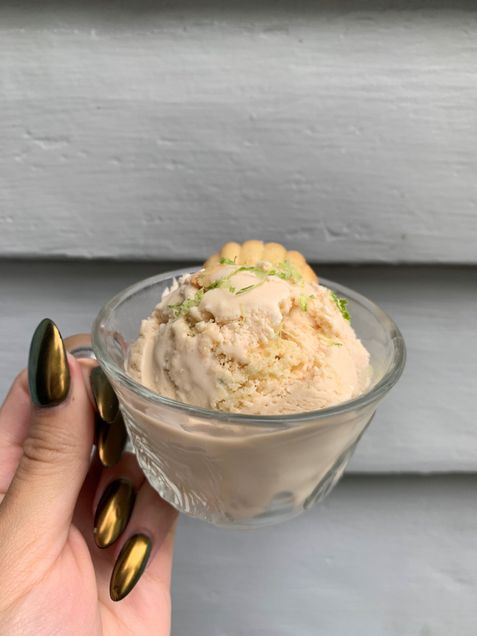
Proust’s Madeleine Moment
Combray Tea Ice Cream with Lime-Scented Madeleines
1 ½ cups cream
2 cups milk
¼ cup corn syrup
¾ cup sugar
5 large egg yolks
1 tablespoon cornstarch
Loose leaf black tea
Dried apples
½ cup crumbled madeleine cookies
- Create two large tea bags with equal parts black tea and dried apple. Place in container with the milk and set aside in the fridge for an hour.
- Make an ice bath by filling a large bowl half to 2/3 of the way with icy water. Set it aside.
- Combine cornstarch with 2 tablespoons milk in a small bowl to make a slurry; make sure it is mixed well and set it aside.
- In a large saucepan, put in the milk (with the tea bags), cream, sugar, and corn syrup. Place it over medium-high heat. Cook, stirring occasionally, until the mixture comes to a boil. Add in slurry and simmer for another minute. Then, remove the pot from the heat.
- In a medium bowl, whisk the egg yolks. Add about ½ cup of the hot dairy mixture to the yolks while whisking to avoid scrambling the eggs.
- Pour the tempered yolks into the pot of hot milk mixture, while whisking. Place the pot over medium-low heat and cook, stirring with a spatula to avoid curdling,
- When the custard begins to thicken, pour the mixture into medium bowl through a strainer to remove any curdled bits of egg yolks. Place the bowl into the prepared ice bath and stir occasionally to help the custard cool down.
- When the base is cool, transfer it to the refrigerator to cure for 4 hours or preferably overnight.
- Place the base into your ice cream maker and churn according to manufacturer’s instructions. Layer the ice cream with the crumbled madeleine cookies.
Works Cited
Erdinç, Ferda. 2001. Journeys through Smell and Taste: Home, Self, Identity. In Food and the Memory, edited by Harlan Walker, 91-99. Totnes, UK: Prospect Books.
Itineraries of Taste. 2019. Proust and the Madeleine. Date of access, June 26, 2019. https://itinerariesoftaste.sanpellegrino.com/dk/how-we-were/proust-and-madeleine
Proust, Marcel. 1913. Remembrance of Things Past. Volume 1: Swann's Way: Within a Budding Grove. The definitive French Pleiade edition translated by C.K. Scott Moncrieff and Terence Kilmartin, 48-51. New York: Vintage. http://ww3.haverford.edu/psychology/ddavis/p109g/proust.html
Tierney, R. Kenji, and Emiko Ohnuki-Tierney. 2012. Anthropology of Food. In Oxford Handbook of Food History, ed. Jeffrey M. Pilcher, 117-134. New York: Oxford University Press.
Warin, Megan, and Simone Dennis. 2005. Threads of Memory: Reproducing the Cypress Tree through Sensual Consumption. Journal of Intercultural Studies 26(1-2): 159-170.
Behind the Counter: an Anthropological View From Inside the Food Industry
Students Karen Metheny’s summer course, Anthropology of Food (MET ML 641) are contributing guest posts. Today's is from Gastronomy student Caley Mahoney, who conducted participant observation for this article.
It wasn’t until I used my position as a bartender and barista for a class project that I realized I had been conducting amateur anthropological research, unconsciously, for years. My role as a participant-observer (AKA an employee in the food industry) was driven by economic concerns, such as making enough money for food and rent, yet at the same time, I had been observing and learning. I have worked in the food industry for almost a decade: I’ve been in lower positions like a hostess and a food runner, moved up a few levels to cheesemonger and caterer, and hit my peak as a manager of a store making buying decisions about beer and wine and running events and marketing. No matter what level of the ladder I was on, every job I worked has brought me intimately close to the public, to the consumers. Being a part of the food industry has given me access to YOU, the consumer; to your everyday, unconsciously repeated norms that I have come to anticipate before they happen, to the extraordinary, bizarre, random instances of human individuality that make me question it all.
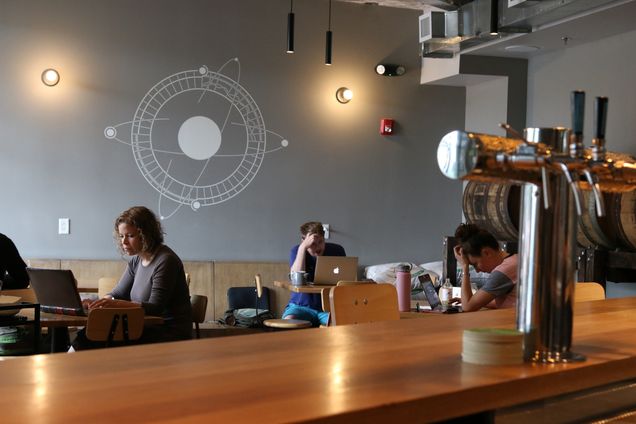
Imagine my surprise when I discovered I had been a researcher this whole time. Disguised in an apron and from behind the counter, I had been observing patterns of human interactions and consumption. My field of ethnographic research wasn’t located in some remote village in sub-Saharan Africa, it was at the register of a cafe, on the floor of a restaurant, and behind the bar of a brewery. As workers of the industry (the good ones anyways) we have learned to anticipate customer needs through thorough observation; we guide you in your choices, we serve you “the usual,” we get you, we know you. We know you, because we’ve been WATCHING YOU, the whole time. (Yes, this sounds creepy, but it’s our job…)
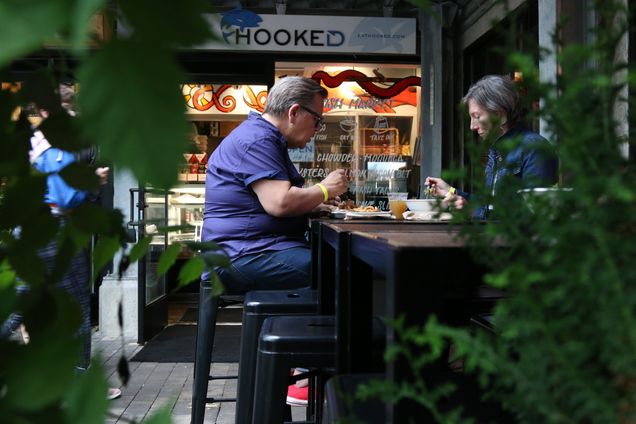
We watch the way you move through our spaces and the way you interact with others. We notice which foods you are drawn to and which ones deter you because of foreign ingredients or fancy labels. We read the calculated decisions about calories and caffeine intake that play out on your faces as you order coffee in the morning. We observe how you fail to read signs that we have painstakingly placed in your path and we know when you get confused by which cut of meat is which, eventually give up and grab a box of pasta instead. We watch you, in order to better serve you. (And to occasionally write a paper for a class on the movements and choices of consumers in public food spaces.)
The line between my life in the food industry and my life as a student studying food is one that easily, and usually, crossed. My two worlds have become so intertwined that I can’t help but notice how Sarah has created a ritualized form of self-imposed food rules, which only allow her post-workout self to indulge in a double chocolate brownie on Saturdays. And isn’t it incredibly obvious that a gendered power struggle between Jim and Martha surfaces every time they order a cappuccino and half-caf almond milk latte? (All names have been changed to protect the anonymity of my research participants). (Also, none of them know that they are research participants in my unintentional study).
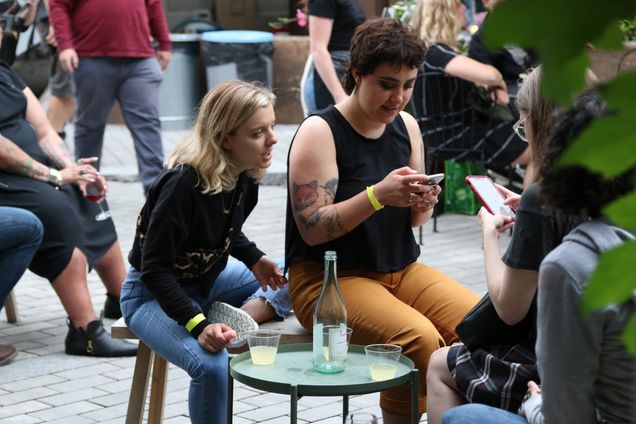
Many of my fellow industry workers see the patterns in public food consumption, the gendered and ethnic based biases, and the various issues of economic and political concern throughout their daily work with food (even if they aren’t conscious of them like I am now). As an industry, we share a heightened sense of awareness, like dogs with their sense of smell; we are a specific breed of human, we can’t help how well we notice and how much we observe. With our specific roles as purveyors of food, we hold not only vital sources of nourishment but we also shape the environment in which consumers make choices that aid in the creation of their identities! And we know these identities: we know how what kind of wine you like to drink, we remember that you don’t like pickles on your Italian sandwich, and we expect to see you every Saturday after yoga. We know your identities because your food choices and foodways tells us these things… and because, well, we are always watching.
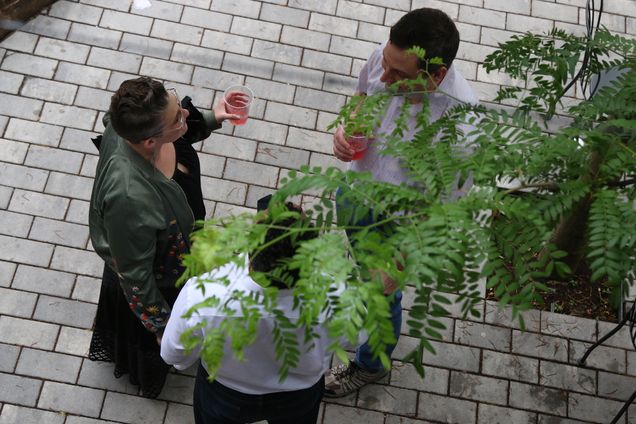
Commensality with the Ancestors and Spirits
Students Karen Metheny’s summer course, Anthropology of Food (MET ML 641) are contributing guest posts. In today's post Gastronomy student Swarnta Prabhu considers different types of commensality.
Chee-Beng defines commensality as “not only a biological act of consuming food but also a communicative act which has the significance of social relations” (2015, 13). For example, food is the active medium that is believed to bridge the gap between the physical world and the psychical realm. The celebration of the memories of ancestors and the appeasement of the souls are performed through the offerings of food, drinks, and other delicacies. This act of serving, nurturing, and nourishing the ancestors and spirits is practiced by several cultures across the globe. Why people use the medium of food in their act of remembrance and feed the ancestors and spirits, what rituals they perform, and which cultures believe in commensality with the spiritual world are questions that allow us to learn more about the practices of spiritual commensality of different cultures and their significance.
In India, Shradh is a prevalent practice among the Hindus through which loved ones are remembered and memories reminisced. The ritual of Shradh is performed during the lunar period of Bhadrprada, the 15-day yearly ritual based on the Hindu calendar (NDTV Food Desk 2017). Shradh is observed to give respect to the ancestors and for the attainment of peace for the departed soul. Shradh involves chanting of prayers by the priests and the family members (primarily the elder son of the family) along with offerings to the holy pyre of rice, black sesame, and ghee (clarified butter). The prayers, which appease the soul, are followed by a vegetarian meal that consists of the dishes or a symbolic dish that the ancestors relished. The food is first served to animals and birds. It is believed that ancestors return to the physical world in the form of animals or birds and it strictly observed that the birds or animals are served first, after which the priests consume the food. Finally the rest of the people may partake in this commensal act. In the Hindu culture, ancestors are believed to visit the physical world as crows, symbolic mediator, and communicator between the physical world and the spiritual world. They partake in the spiritual commensality. Served either on a silver plate or a banana leaf, with ingredients such as sesame, mustard, clarified butter, honey, barley and millet, the meal is an elaborate and ornate preparation.

One can find similar practices in other Asian cultures. Chuseok, a three-day festival observed in Korea, is held to express gratitude to the ancestors for the year’s harvest and the protection provided by the spirits to the people (Funeral Zone 2017). Chuseok is celebrated with families coming together to recognize the contribution of the ancestors, visit family tombs and graves, and share flowers, foods, and drinks with the ancestors. The offerings given to the ancestors on the last day involve specific foods that are oriented in specific spatial directions. Songpyeon, a type of rice cake, is made and offered to the ancestors. The Chinese festival of Qingming, and the Japanese Obon festival also involve paying respect and sharing symbolic foods with the ancestors (2017).
African communities practice spiritual commensality and show their respect to ancestors and spirits through different types of food and drinks. The Haya of Bukoba, Tanzania, conduct ancestor propitiation ceremonies where banana beer is the mediating symbol (Carlson 1990, 297). By reaching altered consciousness through beer drinking, the Haya may placate the ancestors and spirits in order to receive their blessings. The blessings will bring continuity of lineage, the productivity of banana grove, health, fertility, and support and protection from the ancestors. The Zafimaniry of Madagascar also believes in the union of the living and the departed that is witnessed during the feasts (Bloch 1999, 7). Honey and rum are consumed not only to establish closeness amongst the people gathered for the feast but also between the living and the departed. The feast reflects two different emotions: one is the fear of punishment in the form of diseases if the ancestors are not pleased, and the other is a form of joy brought by unification.
Spiritual commensality is evident in many South American cultures as well. Quechua communities of the high Andes frequently consume coca leaves, which are not only a symbol of cultural identity but also a means of connecting with the spiritual realm (Allen 1981). Quechua people share the coca leaves with each other after blowing over the leaves so that the scent of the leaves reach the ancestors, who are believed to bestow blessings. The ritual of communicating with the dead dates back thousands of years in Latin America where people follow different customs and rituals (Robertson 2016). This ritual is known in Ecuador as Día de los Difuntos (Day of the Deceased), and in Mexico it is known as Día de los Muertos (Day of the Dead). This tradition involves remembrance of loved ones by friends and families and sharing of meals to celebrate the journey of the dead to the next life.
In exploring several traditions and rituals related to spiritual commensality, food is the medium through which the occupants of the physical world communicate and express their gratitude to the ancestors. People during their lifetime leave markers through several medium. Food is one such medium which establishes the identity of an individual, community, society, nation, and region. Social markers, left by our ancestors, through mediums such as food are what enable us to remember, cherish, and reminisce their presence. The ubiquity and universality of food, its ability to form an identity, and its capacity to communicate and carry the meaning are unparalleled and the innate reason for being the chosen mode to relate with the spiritual world.
The act of commensality with our ancestors and our loved ones provides us a sense of contentment and emotional prosperity. These rituals provide solace to those who are remembering their loved ones and appease the soul of the one who is being remembered. Some might partake in the ritual out of fear, some out of grief, some to share joy, and although the reasons vary, the unquestionable commonality is the food that promotes commensality, both with the physical world and the spiritual world.
References
Allen, Catherine J. 1981. To Be Quechua: The Symbol of Coca Chewing in Highland Peru. American Ethnologist 8(1): 157-171.
Bloch, Maurice. 1999. Commensality and Poisoning. Social Research 66(1): 133-149.
Carlson, Robert G. 1990. Banana Beer, Reciprocity, and Ancestor Propitiation Among the Haya of Bukoba, Tanzania. Ethnology 29(4): 297-311.
Funeral Zone. 2017. Chuseok Celebrations – Remembering the Dead. Funeral Zone. Date of access, 20 June, 2019. https://www.funeralzone.com/blog/chuseok-celebrations-remembering-dead
NDTV Food Desk. 2017. Shradh 2017: What is Shradh? The Do's and Don'ts to Observe During this Period. NDTV Food Desk. Date of access, 19 June, 2019. https://www.ndtv.com/food/shradh-2017-what-is-shradh-the-dos-and-donts-to-observe-during-this-period-1744437
Robertson, Amy. 2016. Bread Babies and Purple Drink: Ecuador's Spin on Day of the Dead. NPR's The Salt. Date of access, 19 June, 2019. https://www.npr.org/sections/thesalt/2016/11/02/500105108/bread-babies-and-purple-drink-ecuador-s-spin-on-day-of-the-deceased
Tan Chee-Beng. 2015. Commensality and the Organization of Social Relations. In Commensality: From Everyday Food to Feast, ed. Susanne Kerner, Cynthia Chou, and Morten Warmind, 13-29. New York: Bloomsbury.
